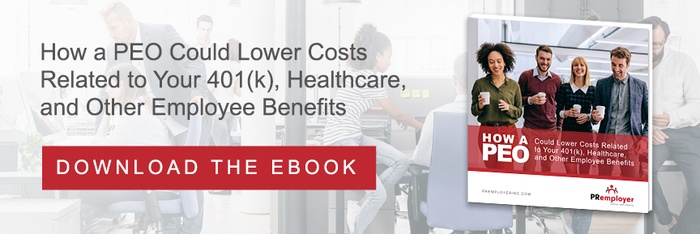
As a small business owner, you have a lot on your plate. In addition to managing operations and ensuring that your products or services are up to par, you must also worry about payroll, benefits, and taxes.
Payroll tax can be incredibly complex and confusing—not to mention the compliance fines can be outrageous— but luckily, there are Professional Employer Organizations (PEO) that can help take some of the burden off your shoulders. Keep reading to learn more about payroll tax and how a PEO can help you manage it.
Understanding Taxes
Federal income tax gets deducted from every employee's paycheck, with few exceptions. These taxes come from the employee's paycheck before receiving their net pay. The same is true for state and local income taxes, where those are levied. Not every state has a state income tax, so it's essential to know the laws where your employees live.
Payroll tax is a type of tax deducted from an employee's wages by the employer and then forwarded to the government. The money withheld from an employee's paycheck covers things like Social Security and Medicare. Employers are also required to pay a matching amount for each employee.
As a small business owner, you must stay up-to-date on payroll tax laws and requirements. Not only do you want to ensure that you are withholding the correct amount from your employees' paychecks, but you also don't want to get behind on payments or fall victim to an audit. The last thing you need is another headache, and it's something a PEO can handle for you.
Tips to Calculate Tax Withholdings
The amount of taxes an employee has withheld from their paycheck depends on several factors, including their filing status, number of deductions, and number of allowances. The type of tax itself also determines how much and when to withhold the tax.
The IRS offers a Tax Withholding Estimator to help you determine whether you’ll likely owe money, get a refund, or break even. However, using it requires having accurate knowledge of your pay stub and prior year tax returns. Being proactive will help you stay on top of your tax payments to create a seamless experience at filing time.
Since nobody looks out for your money like you do, it’s crucial that you take the effort to file your W-4 accurately. Consulting with a professional to get advice and guidance on the proper metrics of filing will give you the clearest picture and set you up for success every year. Simple things like adjusting your withholding if something impacts your financials, either by adding to or lowering them. That can help you avoid a bad surprise come tax time.
If your situation is stable, you can continue using your current W-4 every year. The new w-4 offered changes its calculations some, though you should only worry about completing it if you undergo a change, like getting a new job, have a child, or your wages increase.
When you offer retirement plans, you'll need to deduct those contributions before calculating your employees' gross pay if those deductions are pre-tax. The same is true of any other pre-tax deductions you may need to make.
After you've made all the deductions and tax calculations, you need to determine the employee's net pay. That is the amount left over after calculating deductions and taxes.
How a PEO can Help
A PEO can take care of your payroll tax needs so that you can focus on other aspects of your business. They will ensure that the correct amount is withheld from each employee's paycheck and that you make all payments on time. Payroll errors can be costly, and your PEO can help you avoid them.
A PEO will also keep you updated on any changes in payroll tax law so that you don't have to worry about non-compliance. That can be a tricky area of running a small business that could be extremely costly when mistakes happen.
PEOs work across state lines, too. So, no matter where you have employees working, your PEO should be able to handle the tax calculations and requirements in every state.
In addition to taking care of payroll tax, a PEO can also handle other HR-related tasks like benefits administration and compliance with employment laws. A quality PEO will free up your time to focus on what you're good at and grow your business.
Use the Right PEO
If you are looking for help with payroll tax or any other HR-related matters, consider working with a PEO. A PEO can take care of all your payroll tax needs so that you can focus on other aspects of your business. They will ensure you withhold the correct amount from each employee's paycheck and make all payments on time. A PEO will also keep you updated on any changes in payroll tax law so that you don't have to worry about non-compliance.
The PEO you choose can significantly impact your business, helping you grow strategically. They'll also help keep your business compliant and out of costly trouble, leaving you with more funds to reinvest in your business and your employees.

